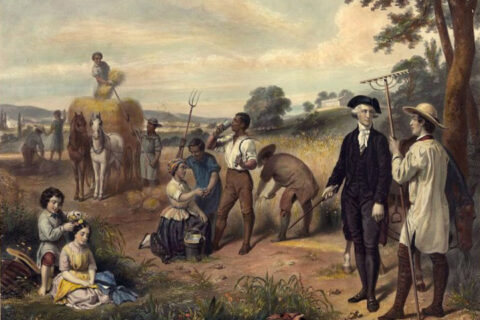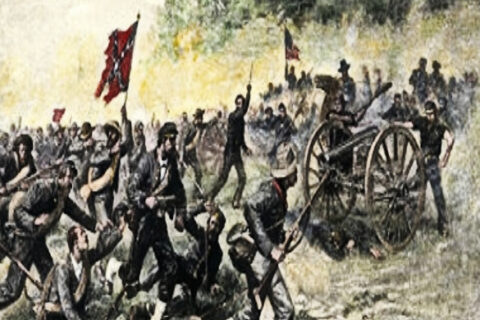This essay is the third entry in the “Great Statesmen Series,” covering the woefully forgotten Eugene Talmadge from the Peach State.
“I am a native Georgian, and my ancestor on all sides of my family have been in Georgia for 150 years. I am steeped in Southern tradition and background. Neither I nor my people have ever strayed from the pasture of Southern tradition. We have not even leaned against the fence.”
The Wild Man
Southern Populism of the first half of the 20th Century carried many seasonings. Whereas Theodore Bilbo of Mississippi and Huey Long Sr. of Louisiana approached populism from a more liberal angle, Eugene Talmadge of Georgia, a state largely devoid of any significant developments in historic grassroots politics, brought with him a fire-eating, peach flavored blend to the mix. Quite unafraid to stir up a political raucous and utilize a strong-arm strategy to achieve his goals in every position he held, Talmadge ushered in, often forcefully and with much uproarious fanfare, conservative, rural, poor folk politics wherever and whenever possible, distinguishing himself from his liberal contemporary champions of the poor. This essay seeks to detail the life, politics, and legacy of the infamously rowdy, wild, and ornery Eugene Talmadge.
Born on September 23, 1884, in the old Talmadge house near Forsyth, Georgia, Eugene grew up on the farmland his family owned since 1824, purchased by his great-grandfather, Tom Talmadge. A slim boy with a thin gait and ill colored countenance due to having developed jaundice at a very early age and despite being reared in farm life, his family was quite affluent compared to most within the area at the time, and Gene, as his family called him, was better suited to reading and fishing than hard labor. Thomas Remalgus Talmadge, his father, noticed early that the young Gene had a knack for intelligence and ensured Gene received the best education Forsyth had to offer. Fortunately, Thomas amassed for himself a notable wealth, growing and ginning cotton following the Reconstruction, one of the very few in the area able to do so. A talented speaker and social influencer, Gene adored debate and often found any excuse to engage in it, and he also found anyway he could to influence the behavior of others, going so far as to talk other boys into fighting each other.
However, his greatest passion as a youth was delivering resplendent, grand speeches. Much like his Mississippi counterpart, Theodore Bilbo, he was simply born with the talent. Gene would often quote speeches made by Napoleon Bonaparte to family members who would humor his endeavor. Furthermore, he reveled in delight at viewings of local political leaders. His favorite, and by far the most influential, was Thomas Edward Watson, a Populist leader in Georgia.
Gene’s young adulthood proved far more difficult than his rearing. He attended the University of Georgia and would ultimately obtain a law degree there. Following this, he had a great difficulty in achieving success and had little direction in what career he wished to pursue. Moreover, his living in Atlanta brought with it a dissatisfaction with life, possibly out of jealousy for the success of local politicians and businessmen. Additionally, this came after his time as a successful academic and student leader at UGA. This resulted in the development of a dejected, belligerent, and downright mean personality. His father, who frequented Atlanta, noticed this and decided to send Gene away to the little village of Ailey for William Peterson. Forbye his disillusionment, Gene was the black sheep of his family, foregoing the genteel, aristocratic nature of his father and adopting a brash, belligerent, and unruly demeanor. Peterson’s idea was to have Gene board with his daughter, Mattie Thurmond Peterson, or “Mitt,” and Gene’s sister, Carrie, while also being in a new environment, particularly a thriving cotton town, to kickstart a law firm. It is also possible Peterson wanted a man around to protect the women.
During his time there, Gene and Mitt became smitten with each other. The courting process progressed so far that Gene decided to move to the nearby town of Mount Vernon, as it would have been seen as inappropriate for him to remain in Ailey with Mitt and Carrie. It was in Mount Vernon that Eugene set up his first law practice.
Gene’s early forays into public service were pitiable, pitiful, and humiliating. At that time, Georgia was run by a network of corrupt big hats known as the “courthouse gang.” Already notorious in the local community for his short temper and brash nature, Talmadge further alienated himself from local networking for his career as a lawyer by constantly butting heads with the infamous courthouse gang. Thus, he was forced to constantly settle for taking on unpopular cases. They consisted of cases in which the clients often had to pay with goods other than money, as they far to indigent to pay with anything other than food they grew or favors. This compounded onto his already negative reputation in Mount Vernon and pushed him further away from success, making him unable to bid for good and reputable cases or win local office. His only successes, between 1918 and 1926, were being elected as solicitor of city court of McRae in 1918 and serving as attorney for Telfair County from 1920 to 1923.
He finally broke into statewide political success in 1926 and stuck it to the courthouse gang by ousting JJ Brown from the position of state agricultural commissioner. Upon investigation, much of the internet appears deeply scrubbed of any details regarding his accomplishments in the position from 1926 to 1932. During his first two-year term alone, “Old” Gene managed to get his office bonded, clean out the last remnants of the highly corrupt Brown network, reduce the overall number of fertilizer inspectors, combat the heavily corrupt fertilizer industry, which happened to be the basis for his campaign, and expand his department into both food, drugs, and marketing. Furthermore, he used the department newspaper, the Market Bulletin, to provide a plethora of farming advice. In 1930 in order to save the collapsing hog market, Gene made a wise political decision to have the Bureau of Markets to buy and sell hogs. During his third term, Gene was investigated for pocketing money given to his department. In his defense, he astonishingly claimed in speeches, “Yeah, It’s true. I stole, but I stole for you, the dirt farmer!” This ironically turned him into a Robin Hood of sorts for Georgia’s rural population and only aided, not impeded, his popularity. By 1932, and with the impending ascension of the sitting governor from state office to the U.S. Senate, Gene’s gaze turned to the desire of a higher office.
Eventually, Old Gene defied expectations yet again upon winning the gubernatorial election of 1932, succeeding the supereminent Richard B. Russell Jr. and further weakening the courthouse gang. Utilizing his fire-eating, strong arm personality in every political scenario presented to him, Governor Talmadge relentlessly butted heads with the corrupt, moderate Georgia legislature. He employed a very idiosyncratic and unusual philosophy of populist idealism, defined by conservatism during a time when most populists were liberal or supported the New Deal. During his first two terms, he managed to lower car tag prices via executive order, reduced utility rates and created a new board to replace the Public Service Commission, seized control of the highway board by using martial law, crushed textile workers’ strikes with the National Guard, and decreased spending. These acts simply made him more popular than ever among his voters, and more maligned by his dumbfounded, unprepared enemies.
While he could have ridden the populist “Wild Man” persona for several more years or even the rest of his life, Gene ultimately made a series of mistakes in correlation with a perfect storm of misfortune during 1935 which permanently hindered his political capital and cost him time in office. Claiming that he allowed the “Republicans to wine and dine me” in his opposition to the New Deal, mocking President Roosevelt’s physical afflictions, running against the aforementioned incredibly popular president, and running against the popular and superlative Senator Richard Russell were a series of grievously asinine miscalculations and faux pas which amounted to nothing less than political suicide.
In an effort to return to political success, Gene began, at least notionally, moderating his stance on the New Deal. His son and future Georgia Governor and U.S. Senator, Herman Talmadge, played a hand in this. Herman was a major adviser to Gene during the latter’s 1940 gubernatorial campaign, keeping in tandem with Gene’s habit of relying on his family members for political advice. He was ultimately successful and returned to the governorship in 1941. Though he may have calmed his anti-New Deal sentiments, genuinely endorsing and attempting to implement it would not have amounted to much. By 1941, the New Deal had already been greatly in decline, and many Southern senators and statesmen had already crippled or outright destroyed it in some cases. Talmadge effected little and accomplished even less during this term. However, he did manage to anger a significant amount of Georgia’s population, to include many of his own voters, in what was dubbed the “Cocking Affair.”
By this time in his career, Governor Talmadge became the mouthpiece of segregation and Jim Crowism in Georgia. This stance ultimately defined his third term. In 1941, Georgia universities began pushing the message of integration. Talmadge, through powers granted to the governorship in 1935, began firing staff members who supported integration, with the most prominent of them being the Dean of Education at the University of Georgia, Walter Cocking. Cocking’s firing was followed by the removal of members of the Georgia Board of Regents who disagreed with the Governor’s decision. All these firings destroyed the state’s schools’ accreditation, and what followed was a slew of anti-Talmadge sentiment among students, parents, and faculty members. As much as Georgians disliked integration, they disliked losing the ability to receive an education even more so. At that time, it was one of the only existing means for the populace to finally break out of abject poverty. The fallout was so great that it easily cost Gene reelection.
He won reelection to a fourth and final term in 1946, one of only two governors in all of Georgia’s history to win four elected terms; however, it did not last very long. At this point, he was 64 years old and quite ill due largely to his lifelong love of cigars and whiskey, and the campaign trail accelerated his senescence. On December 21, 1946, Governor-elect Eugene Talmadge passed away prior to assuming office due to hepatitis compounded with cirrhosis of the liver. It is claimed that his coffin, while lying in state at the Georgia capital, was decorated with a wreath provided by the Knights of the Ku Klux Klan. In death, he gave Georgia one last major bout of political chaos in the form of the “Three Governors Controversy,” in which three different men, Ellis Arnall, Melvin Thompson, and Herman Talmadge, all claimed the governorship. While Herman came out on top, the Supreme Court of Georgia ruled in favor of Thompson, and Herman ceded the office. Eugene’s legacy would continue via Herman upon the latter’s succession to the governorship in his own right during the 1948 election.
The Wild Man from Sugar Creek was a product of his time. Endorsing and Old South ideology during a time of inevitable economic growth and urbanization, Eugene Talmadge fought a losing battle. While his beliefs did have the best interests of poor farmers at heart, it is difficult to say whether or not his unyielding stances against any financial assistance to those folk ultimately kept them in the same state of pennilessness they already existed within. Knuckling down and pulling oneself up by their bootstraps can only carry them so far once they are already at rock bottom; however, he was not incorrect in believing this assistance would result in permanent dependence on the government in the long term. With that said, he did accomplish much veritable good. He made the voices of poor rural folk to the mainstream; weakened the corrupt courthouse gang; broke the unions, a notorious hotbed of communism; and did work to relieve some of the existential pain experienced by his constituents. So dedicated to his beliefs, he sacrificed much of his political career just in the defense of segregation. Despite the impact he had on the Peach State, he remains largely forgotten, especially in the wake of his son’s lengthy, successful, and formidable legacy of his own. However, Gene deserves to be remembered instead of being relegated to the dustbin of history, or rather the dust of the old dirt roads of the Old South he knew and wished to preserve.
Bibliography:
Anderson, William. The Wild Man From Sugar Creek: The Political Career of Eugene Talmadge. Baton Rouge, LA: Louisiana State University Press, 1975.
“Eugene Talmadge – New Georgia Encyclopedia.” New Georgia Encyclopedia. Accessed March 12, 2023. https://www.georgiaencyclopedia.org/articles/government-politics/eugene-talmadge-1884-1946/.
“Eugene Talmadge.” National Governors Association. Accessed March 11, 2023. https://www.nga.org/governor/eugene-talmadge-2/.
Hill, Ray. “Georgia’s Wild Man: Eugene Talmadge.” The Knoxville Focus. Accessed March 11, 2023. https://www.knoxfocus.com/columnist/georgias-wild-man-eugene-talmadge/.
Mayhew, Paul. “The Talmadge Story.” The New Republic, July 22, 1956. https://newrepublic.com/article/90769/the-talmadge-story.
“The White people of the South are the greatest minority in this nation. They deserve consideration and understanding instead of the persecution of twisted propaganda.” –Strom Thurmond






I read that book as a teen.I love old Gene.What a defender of our glorious race.Growth and urbanization continue to destroy what little bit is left of my South.Thank you for this great article on a man I consider a hero and a saint.God bless you.
Glad you enjoyed it. Thanks